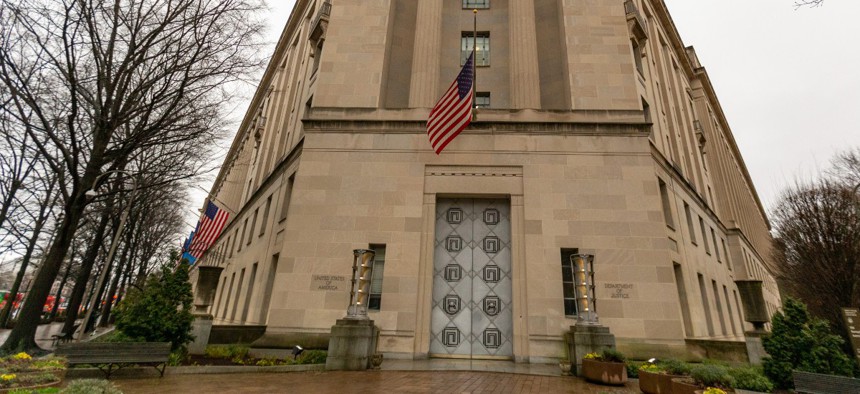
The Justice Department's new guidance said: “Applying a presumption of openness means that agencies should continue to consider all disclosure determinations with transparency in mind.” christiannafzger / Getty Images
The Justice Department Underscores the Need for FOIA ‘Presumption of Openness’
New guidance comes at the start of the annual “Sunshine Week” promoting open government.
The Justice Department issued new Freedom of Information Act guidelines on Monday, underscoring the need to have a “presumption of openness.”
The release came at the beginning of the annual Sunshine Week, which promotes open government, and follows related guidance Attorney General Merrick Garland issued last March. Federal agencies reached a record high of 928,353 information requests in fiscal 2022, and processed a record high of 878,420, according to recently released statistics from the Justice Department. Yet despite the high number of requests processed, the backlog of pending requests increased by 34%. Delays in receiving records requests and redactions in requests received have long frustrated journalists, transparency advocates, lawmakers and others who make use of FOIA.
“Applying a presumption of openness means that agencies should continue to consider all disclosure determinations with transparency in mind,” the new guidance from the Justice Department’s Office of Information Policy said. “Records should be reviewed with an eye toward determining what can be disclosed, rather than what can be withheld. As the attorney general states in the 2022 FOIA guidelines, ‘[I]n case of doubt, openness should prevail.’”
Specifically, if the full disclosure of a record isn’t possible, then agencies should consider making a partial disclosure, the guidance stated.
The guidance also provides advice to agencies in applying the “foreseeable harm” standard, which was codified in the 2016 FOIA Improvement Act. “The foreseeable harm analysis should be made on a case-by-case basis and agencies should individually consider the applicable harms for each record or similar category of records,” the guidance said. “The Court of Appeals for the District of Columbia has explained that to meet their burden, agencies must ‘articulate both the nature of the harm [from release] and the link between the specified harm and specific information contained in the material withheld.’”
Factors agencies can consider when assessing the foreseeable harm include: the record’s age, previous official disclosures and the overall sensitivity of the record. Justice noted that it might be helpful for agencies to consult with subject-matter experts when the foreseeable harms aren’t clear. The annual chief FOIA officer reports also might include helpful examples, the guidance said.
Agencies should work “with requesters in a spirit of cooperation and [on] effectively communicating agency FOIA determinations,” the guidance stated.
Specifically, “when requesters inquire about the status of FOIA requests or request an estimated date of completion, agencies should respond promptly and provide specific updates to keep requesters informed.” The final determination on requests from agencies “should clearly explain the basis for any denials, including, if applicable, any FOIA exemptions asserted and the number of records withheld, except in circumstances where this would cause harm.”
On Friday, the Office of Information Policy, issued an update to its FOIA Self-Assessment Toolkit, a resource for agencies originally released in 2017, in fulfillment of the Fifth U.S. Open Government National Action Plan released in December. One of the goals in the plan related to FOIA is to enhance the user experience on FOIA.gov, “by developing an interactive tool to help members of the public more easily locate records that are already available online or find the right agency to submit their FOIA requests when information is not already posted online.”
According to a report published on Thursday from the National Security Archive, a non-governmental research institution housed at The George Washington University, “key” agencies are still missing from the portal, such as the CIA. This comes seven years after Congress mandated the creation of a new online consolidated portal for FOIA requests.
“Three out of four federal agencies do not even mention FOIA.gov on their individual agency websites, with many funneling FOIA requesters through independent portals with varying degrees of functionality, leaving them unaware of a more simplified way to file a FOIA request,” the report stated. The Biden administration's recent commitments “couldn’t be more timely, given the scheduled, September 30, 2023, decommissioning of FOIAOnline, a FOIA processing and tracking website that was established by the Environmental Protection Agency and used by dozens of agencies during its height.”
FOIAOnline is sunsetting because since its inception in 2012, “the commercial market for FOIA case management applications has seen significant growth and encouraging technological advances,” an explanation on the website stated.
While acknowledging its pitfalls, Eric Lipton, investigative reporter at The New York Times who is a three-time Pulitzer Prize winner, said on Friday the decommissioning is a “disgrace.”







